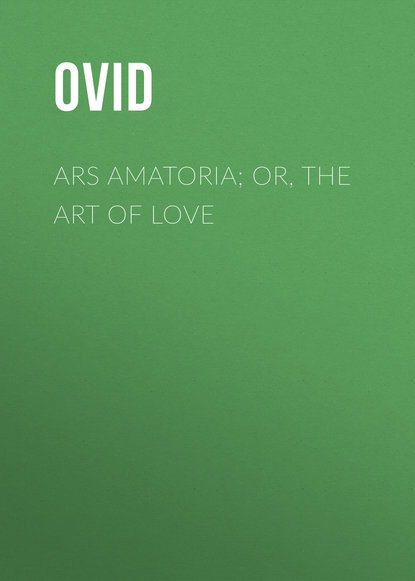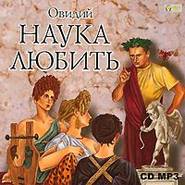По всем вопросам обращайтесь на: info@litportal.ru
(©) 2003-2024.
✖
Ars Amatoria; or, The Art Of Love
Настройки чтения
Размер шрифта
Высота строк
Поля
[ Deceiving lamp.—Ver. 245. This is as much as to remind him of the adage that women and linen look best by candle-light.]
747 (return (#x1_x_1_i45))
[ Why mention Baiæ.—Ver. 255. Baiæ was a town on the sea-shore, near Naples, famous for its hot baths. It was delightfully situate, and here Pompey, Caesar, and many of the wealthy Romans, had country seats: Seneca and Propertius refer to it as famous for its debaucheries, and it was much frequented by persons of loose character. It was the custom at Baiæ, in the summer-time, for both sexes to cruise about the shore in boats of various colours, both in the day-time and at night, with sumptuous feasts and bands of music on board.]
748 (return (#x1_x_1_i45))
[ Hostile hand.—Ver. 260. See the Fasti, Book iii. 1. 263. He means that the Arician grove was much resorted to by those engaged in courtship tad intrigues.]
749 (return (#x1_x_1_i46))
[ Borne upon unequal wheels.—Ver. 264. He alludes to Thalia, the Muse who inspires him, preferring the unequal or Hexameter and Pentameter measure of Elegiac verse.]
750 (return (#x1_x_1_i47))
[ By the lark.—Ver. 286. See the Metamorphoses, Book x.]
751 (return (#x1_x_1_i48))
[ Of Cydon.'—Ver. 293. This was a city of Crete.]
752 (return (#x1_x_1_i48))
[ Untruthful as it is.—Ver. 298. The Cretans were universally noted in ancient times for their disregard for truth. St. Paul, in his Epistle to Titus, ch. i. ver, 12, says, quoting from the Cretan poet Epimenides "One of themselves, even a prophet of their own, said, 'The Cretans are alway liars, evil beasts, slow bellies.' This witness is true."]
753 (return (#x1_x_1_i49))
[ By a bull!—Ver. 302. See this story explained in the Translation of the Metamorphoses, p. 70.]
754 (return (#x1_x_1_i50))
[ The sire.—Ver. 326. This was the Minotaur. See the Metamorphoses, Book viii]
755 (return (#x1_x_1_i51))
[ If the Cretan dame.—Ver. 327. This was Ærope, the wife of Atreus, who slew the children of his brother Thyestes, and set them on table before their father.]
756 (return (#x1_x_1_i51))
[ Who spoiled.–Ver. 331. He falls into his usual mistake of confounding Scylla, the daughter of Nisus, with the daughter of Phorcys.]
757 (return (#x1_x_1_i51))
[ The flames.—Ver. 335. See the Metamorphoses, Book vii. 1. 391, and the Epistle of Medea to Jason.]
758 (return (#x1_x_1_i51))
[ The son of Amyntor.—Ver. 337. Phoenix, the son of Amyntor, according to Homer, became blind in his latter years. See the Note to the 307th line of the Eighth Book of the Metamorphoses.]
759 (return (#x1_x_1_i51))
[ Of thy guiltless sons.—Ver. 339. Phineus was a king of Arcadia, or, according to some, of Thrace or Paphlagonia. His wife, Cleopatra, being dead or divorced, he married a Scythian, named Harpalice, at whose suggestion he put out the eyes of his sons by Cleopatra. He was persecuted by the Harpies, as a punishment.]
760 (return (#x1_x_1_i52))
[ What is one's own.—Ver. 348. 'Suis' seems preferable here to suos.']
761 (return (#x1_x_1_i52))
[ The crop.—Ver. 349. These lines are referred to by Juvenal in the Fourteenth Satire, 1.143.]
762 (return (#x1_x_1_i53))
[ Your access easy.—Ver. 352. See his address to Nape, in the Amores, Book i. El. ii. Cypassis seems to have been a choice specimen of this class. See the Amores, Book ii. El. viii.]
763 (return (#x1_x_1_i53))
[ Pay him in return.'—Ver. 370. This seems to mean, 'I do not think you can make sufficient return for his ardent affection,' referring to the lover. Some of the Commentators think that it signifies a hint from the servant, that as her mistress's husband has offended her by his infidelities, she ought to repay him in his own coin.]
764 (return (#x1_x_1_i54))
[ Is of use.—Ver. 375. This abominable notion seems to have been acted upon by the Poet himself. See the Amores, Book ii. El. viii.]
765 (return (#x1_x_1_i55))
[ Her birthday.—Ver. 405. See the Amores, Book i. El. viii. 1. 94.]
766 (return (#x1_x_1_i55))
[ Whether the Calends.—Ver. 405. The Matronalia were celebrated on the first day of the Calends of March. It was usual on that day, for husbands to make presents to their wives, and lovers to the objects of their affection. The Calends of March preceded April, which month was sacred to Venus. See the Fasti, Book iii. 1. 170.]
767 (return (#x1_x_1_i55))
[ The wealth of kings.—Ver. 408. It was the custom to bring the spoils of the enemy, or the most curious portions of it, to Rome, where it was exposed to view in the Circus and the Theatres. Ovid tells his readers that they must not think that the ladies can give them any of their leisure on such occasions, as, being so much engaged with the sights, they will have no time for love-making.]
768 (return (#x1_x_1_i55))
[ Pleiades prevail.—Ver. 409. This is said figuratively.]
769 (return (#x1_x_1_i55))
[ Tearful Allia.—Ver. 413. The 16th of July, the day on which the Romans were defeated by the Gauls at the Allia, was deemed unlucky, and no business was transacted on it.]
770 (return (#x1_x_1_i55))
[ A day not suited for.—Ver. 415. The Jews are here alluded to. and he refers to their Sabbath. How some Commentators can have dreamed that the feast of the Saturnalia is referred to, it is hard to say.]
771 (return (#x1_x_1_i56))
747 (return (#x1_x_1_i45))
[ Why mention Baiæ.—Ver. 255. Baiæ was a town on the sea-shore, near Naples, famous for its hot baths. It was delightfully situate, and here Pompey, Caesar, and many of the wealthy Romans, had country seats: Seneca and Propertius refer to it as famous for its debaucheries, and it was much frequented by persons of loose character. It was the custom at Baiæ, in the summer-time, for both sexes to cruise about the shore in boats of various colours, both in the day-time and at night, with sumptuous feasts and bands of music on board.]
748 (return (#x1_x_1_i45))
[ Hostile hand.—Ver. 260. See the Fasti, Book iii. 1. 263. He means that the Arician grove was much resorted to by those engaged in courtship tad intrigues.]
749 (return (#x1_x_1_i46))
[ Borne upon unequal wheels.—Ver. 264. He alludes to Thalia, the Muse who inspires him, preferring the unequal or Hexameter and Pentameter measure of Elegiac verse.]
750 (return (#x1_x_1_i47))
[ By the lark.—Ver. 286. See the Metamorphoses, Book x.]
751 (return (#x1_x_1_i48))
[ Of Cydon.'—Ver. 293. This was a city of Crete.]
752 (return (#x1_x_1_i48))
[ Untruthful as it is.—Ver. 298. The Cretans were universally noted in ancient times for their disregard for truth. St. Paul, in his Epistle to Titus, ch. i. ver, 12, says, quoting from the Cretan poet Epimenides "One of themselves, even a prophet of their own, said, 'The Cretans are alway liars, evil beasts, slow bellies.' This witness is true."]
753 (return (#x1_x_1_i49))
[ By a bull!—Ver. 302. See this story explained in the Translation of the Metamorphoses, p. 70.]
754 (return (#x1_x_1_i50))
[ The sire.—Ver. 326. This was the Minotaur. See the Metamorphoses, Book viii]
755 (return (#x1_x_1_i51))
[ If the Cretan dame.—Ver. 327. This was Ærope, the wife of Atreus, who slew the children of his brother Thyestes, and set them on table before their father.]
756 (return (#x1_x_1_i51))
[ Who spoiled.–Ver. 331. He falls into his usual mistake of confounding Scylla, the daughter of Nisus, with the daughter of Phorcys.]
757 (return (#x1_x_1_i51))
[ The flames.—Ver. 335. See the Metamorphoses, Book vii. 1. 391, and the Epistle of Medea to Jason.]
758 (return (#x1_x_1_i51))
[ The son of Amyntor.—Ver. 337. Phoenix, the son of Amyntor, according to Homer, became blind in his latter years. See the Note to the 307th line of the Eighth Book of the Metamorphoses.]
759 (return (#x1_x_1_i51))
[ Of thy guiltless sons.—Ver. 339. Phineus was a king of Arcadia, or, according to some, of Thrace or Paphlagonia. His wife, Cleopatra, being dead or divorced, he married a Scythian, named Harpalice, at whose suggestion he put out the eyes of his sons by Cleopatra. He was persecuted by the Harpies, as a punishment.]
760 (return (#x1_x_1_i52))
[ What is one's own.—Ver. 348. 'Suis' seems preferable here to suos.']
761 (return (#x1_x_1_i52))
[ The crop.—Ver. 349. These lines are referred to by Juvenal in the Fourteenth Satire, 1.143.]
762 (return (#x1_x_1_i53))
[ Your access easy.—Ver. 352. See his address to Nape, in the Amores, Book i. El. ii. Cypassis seems to have been a choice specimen of this class. See the Amores, Book ii. El. viii.]
763 (return (#x1_x_1_i53))
[ Pay him in return.'—Ver. 370. This seems to mean, 'I do not think you can make sufficient return for his ardent affection,' referring to the lover. Some of the Commentators think that it signifies a hint from the servant, that as her mistress's husband has offended her by his infidelities, she ought to repay him in his own coin.]
764 (return (#x1_x_1_i54))
[ Is of use.—Ver. 375. This abominable notion seems to have been acted upon by the Poet himself. See the Amores, Book ii. El. viii.]
765 (return (#x1_x_1_i55))
[ Her birthday.—Ver. 405. See the Amores, Book i. El. viii. 1. 94.]
766 (return (#x1_x_1_i55))
[ Whether the Calends.—Ver. 405. The Matronalia were celebrated on the first day of the Calends of March. It was usual on that day, for husbands to make presents to their wives, and lovers to the objects of their affection. The Calends of March preceded April, which month was sacred to Venus. See the Fasti, Book iii. 1. 170.]
767 (return (#x1_x_1_i55))
[ The wealth of kings.—Ver. 408. It was the custom to bring the spoils of the enemy, or the most curious portions of it, to Rome, where it was exposed to view in the Circus and the Theatres. Ovid tells his readers that they must not think that the ladies can give them any of their leisure on such occasions, as, being so much engaged with the sights, they will have no time for love-making.]
768 (return (#x1_x_1_i55))
[ Pleiades prevail.—Ver. 409. This is said figuratively.]
769 (return (#x1_x_1_i55))
[ Tearful Allia.—Ver. 413. The 16th of July, the day on which the Romans were defeated by the Gauls at the Allia, was deemed unlucky, and no business was transacted on it.]
770 (return (#x1_x_1_i55))
[ A day not suited for.—Ver. 415. The Jews are here alluded to. and he refers to their Sabbath. How some Commentators can have dreamed that the feast of the Saturnalia is referred to, it is hard to say.]
771 (return (#x1_x_1_i56))














